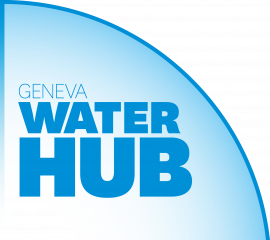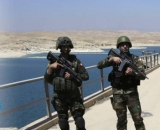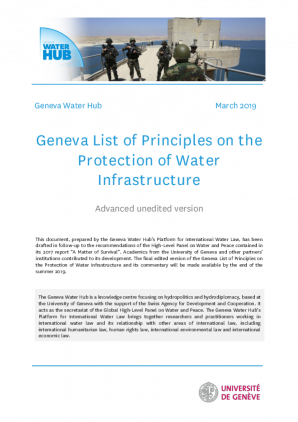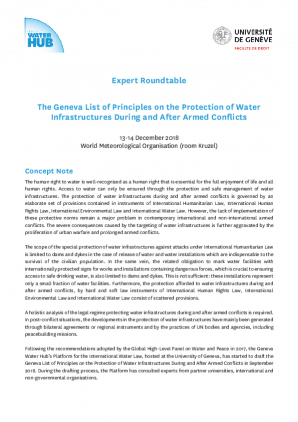Table ronde - « The Geneva List of Principles on the Protection of Water Infrastructures During and After Armed Conflicts »
- Impact
-
Liste des participants
Andrea Aeby
Permanent Mission of Switzerland to the United Nations.
Fuad Bateh
Global Water Partnership-Mediterranean.
Laurence Boisson de Chazournes
Faculty of Law, University of Geneva and Member of the Global High-Level Panel on Water and Peace, Geneva Water Hub.
Catherine Brölmann
Faculty of Law, University of Amsterdam.
Carl Bruch
Environmental Law Institute and Environmental Peacebuilding Association.
Lucius Caflisch
Graduate Institute of International and Development Studies.
Natasha Carmi
Geneva Water Hub.
Evaristo De Pinho Oliveira
International Committee of the Red Cross.
Daniella Dam de-Jong
Faculty of Law, Leiden University.
Juan Francisco Escudero Espinosa
Faculty of Law, University of Léon and Geneva Academy of International Humanitarian Law and Human Rights.
Nadim Farajalla
Faculty of Agricultural and Food Sciences, American University of Beirut.
Laurent Gisel
International Committee of the Red Cross.
Öykü Irmakkesen
Geneva Water Hub and Platform for International Water Law, Faculty of Law, University of Geneva.
Elisabeth Koek
Norwegian Refugee Council.
Robert Kolb
Faculty of Law, University of Geneva.
Amanda Kron
United Nations Environment Programme.
Marja Lehto
Ministry of Foreign Affairs of Finland and Special Rapporteur of the International Law Commission on the Protection of the Environment in Relation to Armed Conflicts.
François Münger
Geneva Water Hub
Helen Cecilia Obregon Gieseken
International Committee of the Red Cross.
Richard Pearshouse
Amnesty International.
Marco Pertile
Faculty of Law, University of Trento.
Dominique Porteaud
UNICEF.
Madoka Saji
Office of the United Nations High Commissioner for Human Rights.
Lena Salame
Geneva Water Hub.
Komlan Sangbana
Platform for International Water Law, Faculty of Law, University of Geneva.
Marco Sassòli
Faculty of Law, University of Geneva.
Michael Talhami
International Committee of the Red Cross.
Mara Tignino
Geneva Water Hub and Platform for International Water Law, Faculty of Law, University of Geneva.
Michel Veuthey
Webster University.
Doug Weir
The Conflict and Environment Observatory.
Liste des autres experts consultés
Michael Bothe
Faculty of Law, Goethe University Frankfurt.
Théo Boutrouche
Office of the UN High Commissioner for Human Rights.
Grieve Timothy
UNICEF.
Britta Sjostedt
Faculty of Law, Lund University.
Jeannie Sowers
College of Liberal Arts, University of New Hampshire.
Erika Weinthal/h3>
Sanford School of Public Policy, Duke University.
Le rapport présente les résultats de la table ronde.
Cette table ronde a généré de l'intérêt de la part de partenaire et a été suivie par l’organisation des évènements suivants.
- "Water in Armed Conflicts", International Peace Institute Lunchtime Policy Forum Event, on 22 March 2019, organized by The International Peace Institute (IPI), UNICEF and the Geneva Water Hub.
- "Seminar on the Geneva List of Principles on the Protection of Water Infrastructure in Relation to Armed Conflicts", on 20 March 2019, Washington, D.C. Organized by Geneva Water Hub, Environmental Law Institute, and Environmental Peacebuilding Association
- "The Protection of Water Infrastructure in Relation to Armed Conflicts", World Bank Lunch Discussion, on 18 March 2019, organized by the World Bank Water Global Practice and the Fragility, Conflict and Violence Global Themes Department and the Geneva Water Hub.
Les photos de l'évènement sont disponibles ci-dessous.
Le droit à l'eau est un droit humain fondamental pour la vie et le respect de tous les droits de l’homme. L'accès à l'eau ne peut être assuré que par la protection et la gestion sûre des infrastructures hydrauliques. La protection des infrastructures hydrauliques avant, pendant et après les conflits armés est régie par un ensemble élaboré de dispositions contenues dans les instruments de droit international humanitaire, de droit international des droits de l'homme, de droit international de l'environnement et de droit international de l'eau. Cependant, la mise en œuvre de ces normes protectrices demeure un problème majeur dans les conflits armés internationaux et non internationaux contemporains. Les conséquences du ciblage des infrastructures hydrauliques sont aggravées par la prolifération des guerres ayant lieu dans des villes et par la prolongation du cycle de violence.
Suite aux recommandations du Panel mondial de haut niveau sur l'eau et la paix de 2017, le Geneva Water Hub et la Plateforme pour le droit international de l'eau douce de l'Université de Genève ont commencé à élaborer la Liste de principes de Genève sur la protection des infrastructures hydrauliques en septembre 2018. Au cours du processus de rédaction, la Plateforme a consulté des experts issus du monde universitaire ainsi que des experts travaillant dans des organisations internationales et non gouvernementales.
La Liste de Genève est un document de référence préparé à l'intention des parties aux conflits armés, des organisations internationales et des autres praticiens travaillant dans les contextes de conflits armés, y compris dans des situations pre- et post-conflictuelles. Elle est le premier document qui systématise les principales règles applicables dans ces situations et présente des bonnes pratiques.
Le programme de l'évènement est disponible ci-dessous.



